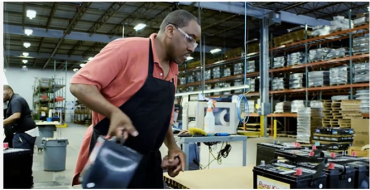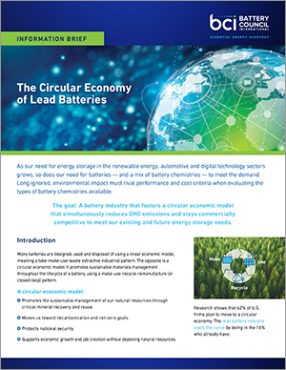
Since the first Earth Day in 1970, more than 1 billion people (1 of every 12) have mobilized for the future of our planet. Although this year’s celebration – the 50th anniversary of Earth Day – will be limited to digital, we can still maintain the momentum.
It’s more important than ever. Earth Day 2020 comes at a time of two converging crises – COVID-19 and climate change. We’re proud that the lead battery manufacturing and recycling industries are helping to stop climate change AND provide essential services during the pandemic.
Reducing the Threat of Greenhouse Gas Emissions
Before the pandemic emerged, Earth Day organizers said “climate change represents the biggest challenge to the future of humanity and the life-support systems that make our world habitable.” We all want to do our part to help reduce greenhouse gas emissions, one of the top contributors to our warming planet.
Lead batteries support key applications and technologies that help reduce emissions.
- Renewable Energy By 2040, energy demand is expected to increase 30%, the equivalent of adding another China and India to our planet. Renewable energy sources will help meet that demand. Lead batteries are an important technology to provide energy storage for wind and solar farms to capture energy generated, store it, and release it when needed. Lead battery systems reduce power fluctuations and increase reliability to deliver on-demand power.
- Start-stop Technology This technology reduces fuel consumption and emissions by stopping the engine when the car comes to a full stop and seamlessly restarting when the brake is released. In 2020, start-stop technology using lead batteries will help eliminate 4.5 million tons of greenhouse gas emissions in the U.S., equivalent to the annual energy use of nearly 500,000 average U.S. households.
- Electric Vehicles (EVs) Lead batteries are in nearly every EV manufactured in the U.S. Although EVs remain a small part of the U.S. transportation fleet, lead batteries play an important safety and security role. If an EV’s primary battery fails or overheats, the auxiliary lead battery provides the backup power to ensure the driver can still brake, steer and access essential electrical and safety functions in an emergency. Lead batteries also store, regulate and ensure power at EV charging stations.
Promoting a Model Circular Economy
Nearly 100% of all lead batteries are recycled, and new lead batteries are comprised of over 80% recycled material. The nationwide circular infrastructure of the lead battery industry reduces emissions, with less need for mining virgin materials.
Overall, this recycling keeps 130 million used lead batteries from landfills annually. By designing in the end-of-life consideration from the outset, lead batteries avoid the linear model of less-sustainable battery chemistries that follow a take-make-use-waste pattern.
According to Dr. Carole Mars, The Sustainability Consortium, lead batteries close the loop more effectively than any other product in the consumer goods space. We wear that recognition as a badge of honor, as we design new batteries to store energy, power and connect our lives across their lifespan.
Providing Essential Service during the Pandemic
Until our world gets back on track, know that lead batteries will continue to do double duty as sustainability champion and pandemic fighter.
Lead batteries will remain available to maintain the essential services to protect, connect, transport and power our lives; to continue providing critical backup power for 911 call centers and emergency response teams, as well as emergency power if there’s an outage. We’ll keep emergency vehicles, semi-trucks and deliver vehicles running. We’ll power the forklifts helping to build temporary hospitals, and we’ll provide 90% of the backup power for the 24/7 telecommunications we need to stay connected as businesses and schools operate remotely.
How to “Earth Day” in Place
Above all, we wish you good health. We also hope you’ll find a moment to honor 50 years of Earth Day. You can find digital events near you and learn other ways to get involved using social media at Earth Day 2020.








